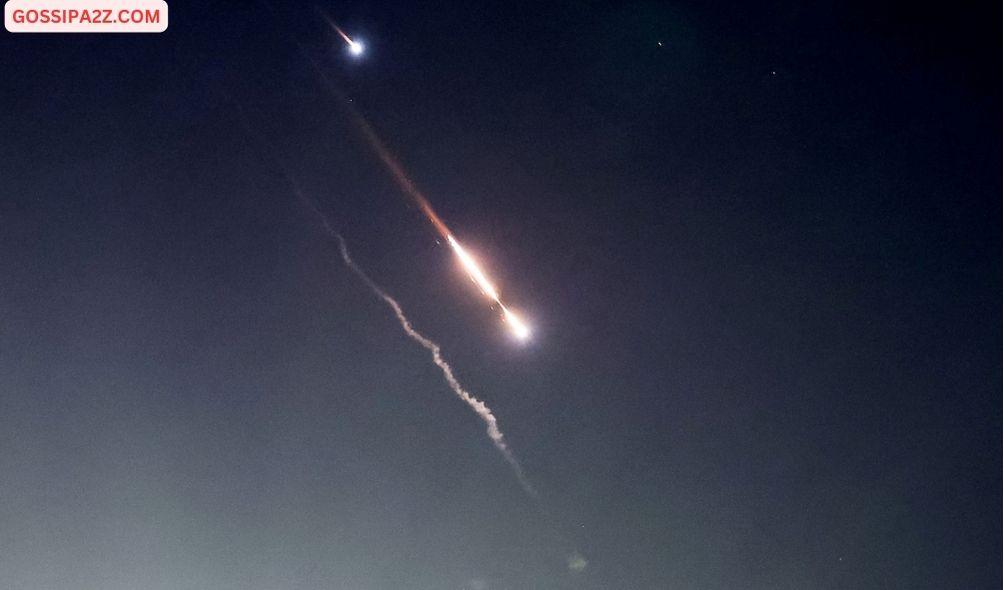What Iranian strikes on Israel mean for Kenya
The recent attacks by Iran targeting Israel over the weekend may present a diplomatic and economic dilemma for Kenya and its neighboring countries. They are striving to steer clear of aligning with any party involved in the escalating tensions in the Middle East.
Kenya’s President William Ruto and South Africa’s leader Cyril Ramaphosa adopted a conciliatory approach, warning that the recent conflicts in the Gulf pose a significant threat to global security and peace. They emphasized the potential for the situation to escalate into a full-scale war if not addressed promptly.
The recent developments in the Middle East may negatively impact Kenya’s importation of oil, cereals, and mechanical equipment, as highlighted by the Trade Minister, who cautioned about potential hurdles in trade logistics.
On Saturday night, Iran initiated a barrage of missiles and drones directed toward Israel amidst escalating regional tensions stemming from the conflict in Gaza.
“Kenya is deeply concerned by Iran’s attack on the State of Israel. This disturbing development only serves to aggravate an already delicate situation in the Middle East,” President Ruto said on X.
“The attack represents a real and present threat to international peace and security, contravenes the Charter of the United Nations, and should be condemned by all peace-loving countries,” he added.
Iranian official sources reported that the assault was a response to an Israeli attack on an Iranian diplomatic facility in Syria on April 1st.
ALSO READ:
- “Two Groups, One Agenda”: Gachagua Accuses Raila of Secret Political Deals
- Exclusive: Ida Odinga’s 75th Birthday Party in Karen (Photos)
- FKF President Discloses Exact Amount Paid to Harambee Stars Players
- Gachagua’s Ally Senator John Methu Admits Ruto Might Win 2027 Elections
- Maraga Explains Why He Hasn’t Campaigned in Kisii Despite 2027 Bid
Israel has carried out strikes in Syria against Iran and its allies for years and throughout its six-month military campaign against Hamas in Gaza.
The April 1 assault was notable due to its occurrence within a diplomatic compound, typically considered immune from conflict, and the high-ranking status of those seemingly targeted.
The Iranian consulate in Damascus, Syria, was reportedly attacked, resulting in the deaths of members of Iran’s Islamic Revolutionary Guard Corps, including senior commander Mohammad Reza Zahedi and Brigadier General Mohammad Hadi Haj Rahimi, according to Iranian media.
“In responding to this act of aggression, Kenya urges Israel to show utmost restraint taking into account the urgent need for all parties to walk away from the brink beyond which recovery will be enormously difficult,” said President Ruto.
In response to the assaults on Israel by Iran, South Africa expressed deep apprehension regarding the unfolding events.
“As the Secretary General of the United Nations, Antonio Guterres has stated, there is a very real danger of a devastating region-wide escalation’,” a statement from the South government said.
“In this context, South Africa emphasizes that all parties must exercise the utmost restraint and avoid any act that would escalate tensions in a particularly fragile region.”
Logistics for exports and imports in East Africa, the Horn of Africa, and Southern Africa are complicated by the threat of a potential large-scale conflict in the Middle East.
Rebecca Miano, the Trade Minister of Kenya, warned that the conflicts in the Middle East might disrupt the smooth flow of trade across Africa, potentially impacting Kenya’s trade with Europe and the Gulf countries.
“Most of the effect is the interruption of the supply chain. It is likely to affect the whole of Africa,” said Ms Miano.
ALSO READ: Iran’s Strike on Israel: Unraveling the Facts
The transportation of Kenya’s primary imports, such as processed petroleum, palm oil, wheat, pharmaceuticals, and automobiles sourced predominantly from China, the United Arab Emirates, India, Malaysia, and Saudi Arabia, is expected to encounter logistical challenges.
She warned that if tensions worsen, Kenya and its neighboring countries should seek solutions originating within their region.
“It is a wake-up call and an opportunity for countries to be self-sufficient as much as possible in terms of manufacturing. We must start looking at the strategic commodities that are necessary the same way we learned during Covid when we started manufacturing things that we used to import,” said Ms. Miano.
As a result of the ongoing tension between Russia and Ukraine, the average cost of sea freight surged by $500 per container, while global trade volumes plummeted by 42%, as stated in a situational report by the United Nations Conference on Trade and Development (UNCTAD) issued in March.
In March, coffee and tea from Uganda and Kenya, which are transported along the Northern corridor serving Uganda, South Sudan, Rwanda, and the DR Congo, got held up in warehouses. Exporters faced steep sea freight expenses caused by surging demand for vessels.
ALSO READ: President Ruto Condemns Iran’s Attack On Israel, Urges Restraint
Besides the conflict in the Gulf, the ongoing warfare in the eastern Democratic Republic of Congo has impacted the movement of goods and services throughout the East African region.
“War is not going to stop so there is a need for both diplomatic and political solutions. Under the international law on how to resolve conflicts when they arise, the UN charters have a way of dealing with that,” said Prof Ben Sihanya, an international democracy and constitutional lawyer.
President Biden criticized the attacks and held a conversation with Israeli Prime Minister Benjamin Netanyahu to reaffirm the United States’ dedication to Israeli safety.
What Iranian strikes on Israel mean for Kenya
